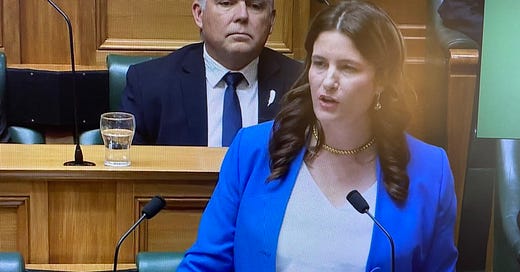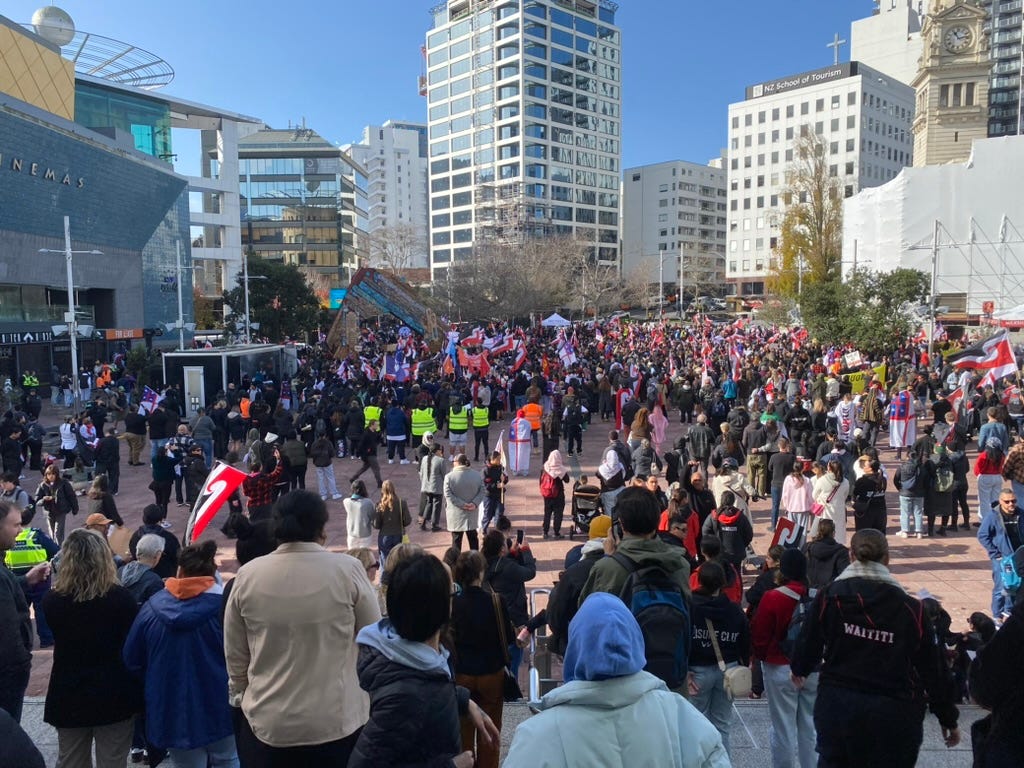The coalition government’s first Budget gives workers a short-term buzz, but doesn’t bode well for election 2026.
The annual Budget is about fiscal and economic policy, including taxing, spending and borrowing. It puts into practice the government’s priorities and values by allocating resources throughout society.
But the minister of finance’s speech is also a political statement that aims at the next election. So, how did Nicola Willis carry it off? With confidence and conviction, and – for a moment there – she almost had me convinced!
Her speech was pitched to the average Kiwi or “the squeezed middle”. The focus was on managing spending, matched with tax relief, more or less as the National Party had promised in the election campaign. Low to middle income working families with children are the target of the income-tax cuts and tax-credit increases.
Ms Willis went so far as to assert that the coalition parties are “the parties of the worker” as they want people to keep more of what they earn. She said that the tax relief package is fully funded, mainly from savings.
But economic downturn and weaker revenue are taking their toll. The Treasury’s December 2023 half-year update had projected the operating balance returning to surplus in the 2025/26 fiscal year. Now that’s been pushed back by two years (not one year, as Ms Willis stated) to 2027/28. And Westpac’s economist isn’t convinced that even this delayed surplus target can be met.
From your point of view, here’s the basic problem: “Per capita, the economy declined 2.8% in 2024”, according to Dan Brunskill, interest.co.nz. Aggregate growth rates have been supported by net positive immigration, masking the real decline for individuals.
Furthermore, with a growing deficit expected in 2024/25, net public debt is projected to remain above the government’s own ceiling of 40% of GDP. So, by the time the next election rolls around in late 2026, the government will have failed to reduce debt. With higher interest rates on that debt, there’s less money available to fund the public services you rely on. Nicola Willis noted that the operating allowances will be tight and that further savings and reprioritisation will be crucial in future.
In effect, the tax relief you’ll get in your pocket will accompany higher levels of public debt and cuts to public services.
While a return to growth above 2% per annum is projected, this won’t directly augment your household budget. And if you’re hanging out for lower mortgage rates, you’ll be waiting a while for that too. Rates should decline as inflation falls, but Budget 2024 isn’t seen as helpful in that regard.
Will the average Kiwi be feeling better off after three years of Luxon’s coalition government?
For now, you can rate the tax relief package in the reader poll below.
Having a dig at Labour, Willis called her Budget “the clean-up job New Zealand needs after six years of economic mismanagement”.
Chris Hipkins, replying as leader of the Opposition, gave a spirited critique, but painted himself into a corner. He claimed that the tax relief package would have an inflationary effect – implying it would backfire on workers – and yet also that the package would deliver less than National had previously promised – as if they were supposed to do more. He said that the government was planning to borrow sums that exceeded the tax-relief package – and hence that it was partially unfunded – even though the Treasury’s figures show that, annually, the tax relief is balanced by savings and revenue.
The idea of “unfunded tax cuts” has been anathema since the calamitous budget of the short-lived UK prime minister Liz Truss and her finance minister Kwasi Kwarteng in 2022. Hipkins was trying hard to mobilise that fear. But no one’s denying that the government’s borrowing programme has been revised upwards.
On target, Hipkins did point out that Willis’s speech didn’t mention child poverty, and didn’t address the discontent being expressed in the streets by Māori on the same day.
Te Pāti Māori MPs were absent from the debating chamber during her speech. And now they’re reported to have declared independence with the aim of establishing a Māori parliament. I wonder what their first budget will look like.
To sum up:
There’s rebellion on the streets.
Public services are under pressure for savings.
Unemployment is rising.
A government that promised “to grow the economy” imports more workers to achieve that, but doesn’t improve real-world living standards.
The country isn’t broke, but public debt won’t be reduced.
Looking ahead to the next election, Luxon & Co have few options for winning over the voters.
Māori may convene an alternative assembly.
Another day watching politics happen.
Shortly after 2pm Thursday:
But the protestors had gathered in Aotea Square, Auckland, and elsewhere three hours before.







I wasn’t expecting much and they delivered. But I’m very unhappy about the broken promise on cancer drugs - it was a cynical campaign promise they never should have made (National knows how Pharmac works and how much pressure the drugs budget comes under), but having made it, they needed to honour it. Gutless. Feeling for the people whose hopes were raised and dashed.
Changing income tax and Working for Families thresholds and tax on landlords reduce revenue by around $10 billion over the next 4 years. As there is also a $12 billion increase in borrowing over the same period, compared to the figures in the HYEFU, the government claims that the tax cuts are fully funded is simply untrue.